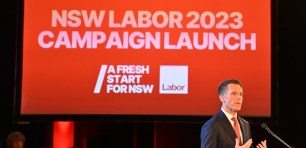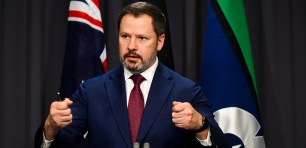
Incoming NSW Premier Chris Minns speaks to the media during a press conference following last nights election win, Kogarah, Sydney, Sunday, March 26, 2023. NSW Labor is preparing to form government for the first time in more than a decade after a definitive victory which shattered coalition hopes of a historic fourth term. Source: AAP Image/Dean Lewins
The Labor Party is set to form government in New South Wales for the first time in 12 years, ushering in a new suite of small business policies and ministers pledging to make good on the party’s election promises.
Saturday’s state election saw a significant swing against the Coalition government of former Premier Dominic Perrottet, clearing the way for NSW Labor leader Chris Minns to step into the top job.
With the count still underway, Labor has secured 45 seats, and is expected to clear the 47-seat mark needed to form a clear majority government. By contrast, the Coalition has won 25, and is not expected to secure many more.
As the celebrations simmer down, work to determine the shape of Premier-elect Minns’ ministry is ramping up.
Labor MP Steve Kamper appears to be a frontrunner for the role of Minister for Small Business, taking the step up from Shadow Minister for Small Business, a role has has occupied since June 2021, and is taking over from outgoing Liberal MP Victor Dominello.
First elected to the NSW Legislative Assembly in 2015 as the Member for Rockdale, Kamper is in prime position to deliver Labor’s extensive small business policy, which the party claims will strengthen ties between the government and small business, even as Labor champions its anti-privatisation stance.
Going into the election, Labor promised to boost procurement from small businesses, vowing to more than double the value of expenditure channeled to the SME sector from 12% currently to 30% by the end of the decade.
The party has pledged to apply preferential “weightings” to local businesses vying for government contracts, boost the threshold for direct procurement from $150,000 to $250,000, and cut red tape related to qualification and insurance sign-offs.
The promise to cut red tape was a major theme for small business policies leading up to polling day; the Coalition had its own pledges to lower the administrative workload placed on small business operators.
Labor says it will establish the NSW Business Bureau, a new advisory body connecting SMEs to the government and its various business-facing functions.
The proposed entity will help small businesses navigate regulatory requirements, provide insights on tenders and grants, guide SME owners through formal registration processes, and inform them how to market their goods overseas.
Building on Labor’s procurement push, the party claims it will create a dedicated charter for small business, and pledge to “develop new processes and performance metrics” around the small business sector to guide decision-making in the sector.
Small businesses trading under a Labor government can expect a simplified outdoor dining application process, a proposal Kamper celebrated in the lead-up to the election.
Energy bill relief of $315 will roll out to some eligible small businesses, should the party’s election pledge come to fruition. When combined with Commonwealth contributions, some small business are set to be $630 better off per year.
A NSW Labor government would also push to raise the penalties against those found to have assaulted a public-facing business employee, a move which has been welcomed by industry groups and unions alike.
Taxation — a perennial issue for small business — could face some significant overhauls, too. Labor pledges to work with Canberra to allow small businesses to lodge monthly payroll tax returns with the Australian Taxation Office as well as Revenue NSW
Handpicked for you

NSW Labor’s election promise to raise public sector wages would cost $2.6b



COMMENTS
SmartCompany is committed to hosting lively discussions. Help us keep the conversation useful, interesting and welcoming. We aim to publish comments quickly in the interest of promoting robust conversation, but we’re a small team and we deploy filters to protect against legal risk. Occasionally your comment may be held up while it is being reviewed, but we’re working as fast as we can to keep the conversation rolling.
The SmartCompany comment section is members-only content. Please subscribe to leave a comment.
The SmartCompany comment section is members-only content. Please login to leave a comment.